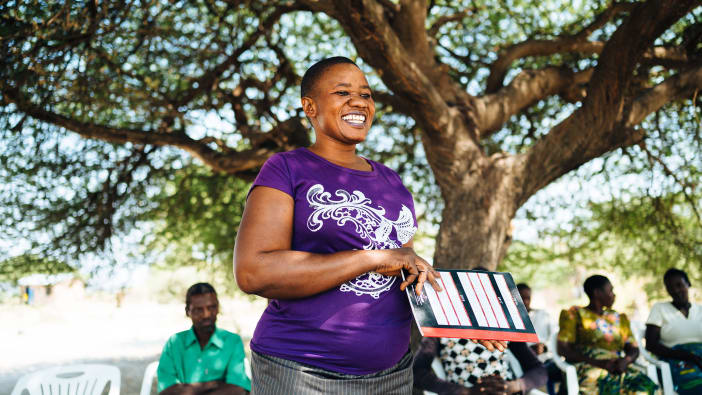There are between two and three million Burmese migrants and refugees currently living in Thailand. In Myanmar (Burma) many people are faced with a wide range of human rights abuses and a poor economy. For them the option of earning a relatively stable wage in Thailand, and being in a position to support families and relatives back at home, is very appealing.
Although Thailand is seen as country of opportunity, migrant workers arriving with no money, no job, and nowhere to stay find that the reality is often very different. The Mekong Minority Foundation (MMF) has been supporting Grace Church in Chiang Rai, to help migrant labour workers from Myanmar gain access to the rights to which they are entitled, as well as helping them to meet their basic needs. Nee Nee*, is a 37-year-old woman who has migrated from Mandalay in Myanmar. Here is her story.
Background
In 2000, Nee Nee decided to leave Myanmar and go to Thailand to try to earn more money for her family. She took her youngest child with her and left the older two children with her parents. Nee Nee paid 1,200 baht (around US$57) to an agent who took her and her daughter to Chiang Rai. At that time there was no official process for migrants to apply for a Thai work permit. Nee Nee found a job as a manual labourer and was quickly able to earn money.
Nee Nee worked in Chiang Rai for several years and was able to put her daughter in a private nursery. In 2004, the laws changed and she obtained a work permit that allowed her to work legally. The work permit was linked to her place of employment, so that the government knew where she was working. This made changing jobs very difficult. Nee Nee also had to pay 2,000 baht as a deposit to her employer in case she damaged any property while she was working. Her employer promised to pay this money back when she left.
Nee Nee’s daughter became very sick and Nee Nee had to miss work to care for her. The employer was not happy with this and was very rude to her. Nee Nee wanted to leave and find work in another place, but the company would not agree to complete the necessary paperwork and return her work permit. Despite this, Nee Nee found a different job about one hour away in another town. When she left, her deposit was not returned to her. The company also did not pay for her last 10 days of work as they said she had not given 15 days’ notice that she wanted to leave. In her new job, she was working illegally because her work permit was still registered at her previous place of employment. Nee Nee wanted to be working legally, so she asked her previous employer for her work permit so that she could transfer it to her new employer. However, they would not release the papers.
Gaining support from MMF
Nee Nee had a friend who was a member of Grace Church in Chiang Rai. Nee Nee learnt that she could receive legal help through Grace Church. The MMF legal advisor who works with the Grace Church staff provided support to Nee Nee as she tried to gain access to her employment rights.
Work permit
The legal advisor went with Nee Nee to visit the company where she used to work. They refused to hand over the work permit, and they were very rude to her and the legal advisor. Nee Nee and the legal advisor went to the office for migrant workers in the government’s labour department. They explained the issue and the officers understood Nee Nee’s situation. They changed her work permit details so she could work legally for her new employer.
Wages and deposit
Next, Nee Nee and the MMF legal advisor returned to her previous employer to ask for the deposit and wages that they owed her. The company denied this request again because they said she had left without giving 15 days’ notice. So, she and the MMF legal advisor went to the government’s Labour Protection and Welfare Office. The officers there asked many questions and recorded all the details. They promised to deal with the situation.
After two weeks the officers contacted Nee Nee and said that the company had agreed to give her the money that was owed. Nee Nee and the MMF legal advisor returned to the company expecting to receive cash as this was the usual method of payment. However, they received a cheque that was marked ‘for deposit only.’ As Nee Nee did not have a bank account, they deposited the cheque into the legal advisor’s personal account. Several days later, after the bank cleared the cheque, Nee Nee received her cash.
Working together
In spite of the money spent on travel, and the time and effort required, the Grace Church committee, the MMF legal advisor and Nee Nee felt that the process was worthwhile. This is because it teaches Thai companies that they should treat people fairly. Also, the migrant workers are learning that help is available and they are learning to trust their Christian friends and work together with them.
Supporting migrant workers
The story of Nee Nee is a common one. Many of the migrant workers from Myanmar have no-one to help them understand the Thai labour laws. Grace Church has specifically been established to minister to Burmese-speaking people, and they have opened their doors to help people like Nee Nee. They have organised activities such as language classes and daily child care to help migrants to adjust to a new society. The Church also helps migrants find jobs and access the rights to which they are entitled. MMF staff have encouraged and worked alongside Grace Church members to do this work.
* Her name has been changed to protect her identity.
Pichai Biangla works for the Mekong Minority Foundation.
PO Box 63 Viang, Muang Chiangrai 57000, Thailand.
Email: [email protected]
Web: http://www.minorityleadership.org/
Although Nee Nee was able to access a legal advisor, most migrants do not have this option. This should not stop them from claiming their rights.
Advocacy can be done without the help of a professional. Anyone can speak out and claim what they are entitled to. They just need to know where to find useful information and how to act on it. A good source of information is http://www.migrantwatch.org/
Discussion questions
- What issues do migrants face in your country when they are trying to find work? Consider issues such as needing a place to live, a work permit, a bank account.
- What legal help is available for migrants so they can gain the rights to which they are entitled?
- What advocacy work can be done to make employers aware of the rights and needs of migrants?
- What advocacy work needs to be done to change labour laws so that migrants can legally find work? How could legal processes be made easier?










